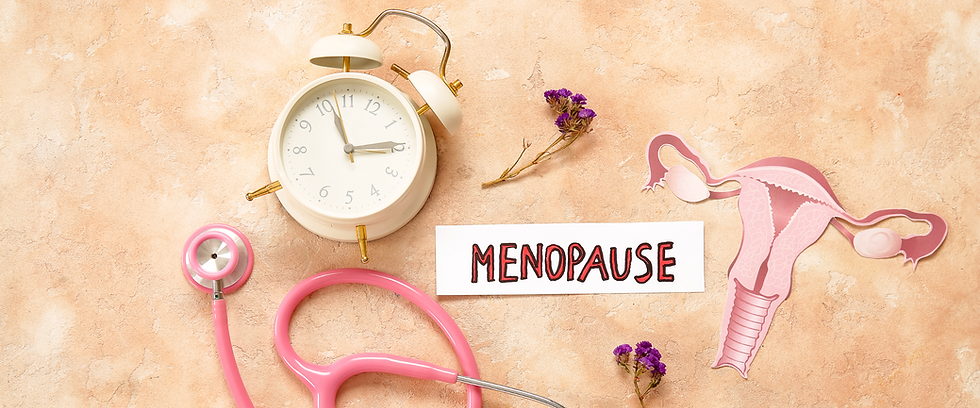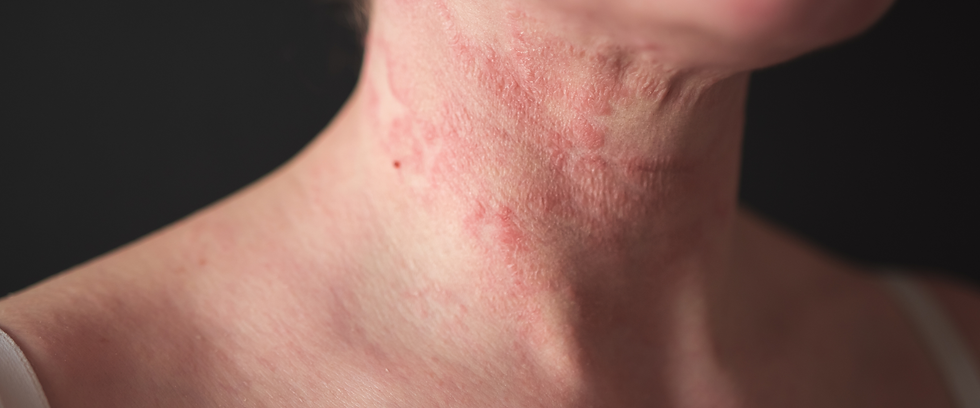Menopause 101: Understanding Menopause Symptoms and What You Can Do About Them
- Lisa Claire
- Jul 8, 2025
- 5 min read
Updated: Sep 16, 2025
Hot flushes. Mood swings. Weight gain. Brain fog. If you're experiencing menopause symptoms that make you feel like a completely different person, you’re not alone. And you're not going mad either.

Menopause isn’t just about the end of your periods. It’s a whole-body hormonal shift that can affect everything from your sleep and skin to your digestion, energy, and mental health.
Let’s break down what’s really going on, starting with what menopause actually is.
What is Menopause?
Menopause marks the end of your menstrual cycle and is confirmed when you haven’t had a period for 12 months in a row. In the UK, the average age for menopause is around 51, but menopause symptoms can begin years earlier in the perimenopause phase.
What Do Menopause Symptoms Actually Feel Like?
Many women experience symptoms like hot flushes, brain fog, stubborn weight gain, and digestive issues, but no two journeys are the same.
We’ll dive into the most common menopause symptoms in a moment, so you can understand what’s normal, what’s not, and what you can do about it.
What Causes Menopause Symptoms?
The main driver? A drop in oestrogen and progesterone. But that’s just the beginning.
Hormones are chemical messengers that influence almost every system in your body, your gut, your brain, your bones, your metabolism. So when they fluctuate, it can feel like everything’s off. And it often is.
This is why you might feel bloated and anxious and wired-but-tired all at the same time.
What Are the Most Common Perimenopause / Menopause Symptoms?

Every woman’s experience is different, but these are the top menopause symptoms I see in clinic:
Mood swings, low motivation or tearfulness
Digestive complaints like bloating or constipation
Fatigue that doesn’t shift, no matter how much you sleep
Stubborn weight gain, especially around your middle
Disturbed sleep or night sweats
Hot flushes during the day
Loss of confidence, libido or drive
Itchy skin, thinning hair, brittle nails
These symptoms are common, but that doesn’t mean you just have to live with them.
Your GP Might Suggest…
Blood tests (FSH, oestrogen) to confirm menopause (especially if you’re under 45)
Hormone Replacement Therapy (HRT)
General lifestyle advice (move more, eat well, etc.)
For many women, this is where the support stops. If you’re still struggling, you may be told it’s “just your age.”But that’s not good enough.
My Functional Approach to Perimenopause / Menopause Symptoms

This is where we dig deeper to figure out why your symptoms are happening, and what to do about them.
1. Build your unique health profile
There’s no one-size-fits-all solution. We explore your symptoms, medical history, diet, lifestyle and stress levels to create a clear picture of what’s going on.
2. Test, don’t guess
We might run private functional tests (not available on the NHS) to look at:
Hormones: cortisol, oestrogen, DHEA, insulin, thyroid
Gut health: microbiome, inflammation, digestive function
Nutrient status: B12, vitamin D, magnesium, iron
3. Balance blood sugar + reduce stress
Blood sugar rollercoasters = more hot flushes, stubborn weight gain, and mood swings. Stress = higher cortisol = even worse symptoms.
We work on:
Simple, balanced meals (protein + fibre + fat)
Calming daily habits (even 5 minutes helps)
Better sleep hygiene that actually works
This also supports your mood. Oestrogen impacts serotonin – your feel-good chemical – so when hormones dip, so can your emotional resilience. Add poor sleep, low B12 or vitamin D, and you’ve got the perfect storm. I often check these levels and recommend magnesium and B6 to support your calming neurotransmitter, GABA. We also explore blood sugar dips as a hidden driver of anxiety or low mood.
4. Support oestrogen metabolism
Whether you’re taking HRT or not, your body needs to clear hormones effectively. We do this with:
Cruciferous veg (like broccoli, sprouts and cauliflower)
Methylated B vitamins (B6, folate, B12)
Antioxidants (sulforaphane, ellagic acid from pomegranates)
5. Strengthen bones for the long term
Oestrogen keeps your bones strong, so when it drops, your risk of osteoporosis goes up. We work to protect your bone density by increasing nutrients like vitamin D, K2, magnesium, calcium and boron.
I also recommend weight-bearing movement (like walking or resistance training), collagen support, and eating in a way that fuels your body regularly. Think of your bones as your scaffolding, we want it strong and steady for the next chapter.
6. Use targeted supplements that fit your body
Supplements aren’t a quick fix, but they can move the needle when personalised to you. I often use a high-quality multinutrient with methylated B vitamins to support hormone balance and energy. Omega-3s are also a go-to for mood, inflammation, joints and skin.
Plant oestrogens (like flaxseeds or red clover) may ease symptoms like hot flushes and dryness. Some clients also benefit from probiotics, magnesium, collagen or adaptogens, but I always tailor this based on what your body’s asking for.
Can I Still Lose Weight During Perimenopause / Menopause?
Yes. But it might look a bit different to your 30s. Oestrogen helps regulate where you store fat and how you use sugar. As levels drop, fat can shift to your middle, and insulin resistance becomes more likely.
What helps:
Eat more fibre (veggies, beans, oats, flaxseeds)
Focus on protein at every meal
Stay active (resistance training is gold)
Prioritise sleep and stress reduction
Balance your blood sugars to reduce cravings and mood dips
What About Bloating, Reflux or Gut Issues?
You’re not imagining it. Falling oestrogen affects your gut lining, fluid balance, and microbiome.
Gut-friendly tweaks:
Add fermented foods (kefir, sauerkraut, kimchi)
Include prebiotics (onions, garlic, leeks, bananas)
Reduce sugar and alcohol (they feed bad bacteria)
Stay hydrated and move daily
Consider a probiotic (based on symptoms/test results)
Simple Hormone-Friendly Recipe: Miso-Glazed Tofu Bowl

Serves: 2
Ingredients:
1 block firm tofu
2 tbsp white miso paste
1 tbsp tamari
1 tsp maple syrup
1 tsp sesame oil
1 cup cooked brown rice
½ avocado
Shredded red cabbage, carrot, edamame beans
Sesame seeds, spring onions to top
Instructions:
Bake tofu in the miso mix at 180°C for 25 mins
Pile everything into a bowl
Top with sesame seeds and spring onion
Plant oestrogens ✔️ Gut fibre ✔️ Hormone support ✔️ Tastes unreal ✔️
Final Thought: You’re Not Alone
Menopause symptoms can affect your confidence, your energy, your relationships, and your whole identity.
But with the right support, they don’t have to define you. If you’re ready to stop guessing and start feeling better, I’m here to help.
Are you ready for a real solution?
Let’s talk. Book your free 20-minute chat and let’s see if working together is the right next step for you 👉 Book here
About Lisa

I’m Lisa Claire Dack, a qualified, registered Nutritional Therapist with a special interest in gut health, hormonal imbalances, energy, skin issues and sustainable weight loss. I work one-to-one with individuals to uncover the root causes of their symptoms and create personalised nutrition, lifestyle and wellness plans that fit seamlessly into their lifestyles. Whether you’re struggling with chronic fatigue, digestive issues, or hormonal imbalances, I’m here to guide you toward lasting health transformations. Let’s work together to help you feel your best.




Comments